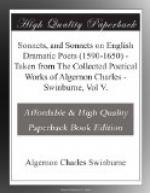What part is left thee, lion? Ravenous beast,
Which hadst the world for pasture, and
for scope
And compass of thine homicidal hope
The kingdom of the spirit of man, the feast
Of souls subdued from west to sunless east,
From blackening north to bloodred south
aslope,
All servile; earth for footcloth of the
pope,
And heaven for chancel-ceiling of the priest;
Thou that hadst earth by right of rack and rod,
Thou that hadst Rome because thy name was God,
And by thy creed’s gift heaven wherein
to dwell;
Heaven laughs with all his light and might above
That earth has cast thee out of faith and love;
Thy part is but the hollow dream of hell.
II
The light of life has faded from thy cause,
High priest of heaven and hell and purgatory:
Thy lips are loud with strains of oldworld
story,
But the red prey was rent out of thy paws
Long since: and they that dying brake down thy
laws
Have with the fires of death-enkindled
glory
Put out the flame that faltered on thy
hoary
High altars, waning with the world’s applause.
This Italy was Dante’s: Bruno died
Here: Campanella, too sublime for pride,
Endured thy God’s worst here, and
hence went home.
And what art thou, that time’s full tide should
shrink
For thy sake downward? What art thou, to think
Thy God shall give thee back for birthright
Rome?
January 1882.
THE CHANNEL TUNNEL
Not for less love, all glorious France, to thee,
“Sweet enemy” called in days
long since at end,
Now found and hailed of England sweeter
friend,
Bright sister of our freedom now, being free;
Not for less love or faith in friendship we
Whose love burnt ever toward thee reprehend
The vile vain greed whose pursy dreams
portend
Between our shores suppression of the sea.
Not by dull toil of blind mechanic art
Shall these be linked for no man’s force to
part
Nor length of years and changes to divide,
But union only of trust and loving heart
And perfect faith in freedom strong to
abide
And spirit at one with spirit on either
side.
April 3, 1882.
SIR WILLIAM GOMM
I
At threescore years and five aroused anew
To rule in India, forth a soldier went
On whose bright-fronted youth fierce war
had spent
Its iron stress of storm, till glory grew
Full as the red sun waned on Waterloo.
Landing, he met the word from England
sent
Which bade him yield up rule: and
he, content,
Resigned it, as a mightier warrior’s due;
And wrote as one rejoicing to record
That “from the first” his royal heart
was lord
Of its own pride or pain; that thought
was none
Therein save this, that in her perilous strait
England, whose womb brings forth her sons so great,
Should choose to serve her first her mightiest
son.




